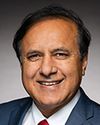Thank you, Chair.
Good afternoon. I really am pleased to appear before you to discuss my priorities and objectives as Minister of Immigration, Refugees and Citizenship.
Mr. Chair, I want to start by acknowledging that we are gathered here today on the traditional and unceded territory of the Algonquin Anishinabe people.
Canada's immigration system has been facing changing realities and growing pressures, even more so in recent years. Multiple humanitarian and public health crises, rising asylum claims and an increased interest in Canada all require a clear plan so that we can continue welcoming newcomers while addressing the backlog of applications.
We are also navigating domestic pressures, such as housing, infrastructure and labour shortages. Newcomers require a clear path so that they can contribute meaningfully to their communities and be part of the solution to these challenges.
Mr. Chair, one of my top priorities is international students. We're currently reviewing the international student program to strengthen its integrity, support universities and colleges, and protect students from unethical recruitment and unreliable consultants.
This study will ensure that the program continues to attract and retain the most brilliant students by helping them become permanent residents, and extending the benefits of immigration to all regions in Canada while helping us meet our francophone immigration targets.
It's essential to factor in the capacity of communities to host newcomers and to provide them with appropriate services and housing, while supporting those caught up in humanitarian crises.
While Canada's housing challenges require a whole-of-government approach, we need to align immigration with other planning while upholding our humanitarian commitments. We also recognize that newcomers with in-demand skills can be part of the solution to housing and other challenges.
Owing to the increase in refugee claims around the world, we are enhancing the capacity, integrity and efficiency of Canada's refugee determination system and investing in temporary housing assistance for refugee claimants.
We are also simplifying access to work permits, which enables refugee claimants to enter Canada's labour market more quickly and helps meet their needs while awaiting a decision on their claim.
It's likely that many of you have seen the Auditor General’s report on processing permanent residence applications. As of August 31, Canada welcomed 339,000 permanent residents—up from 310,000 during the same period in 2022. Our goal is to process 80% of all applications within service standards in order to welcome newcomers and reunite families faster. We continue to reduce backlogs through staffing and technological improvements.
We've made significant progress. Since September we’ve surpassed our standard for processing federal high-skilled worker applications received since July 2022. We’re approaching our standard processing time for provincial nominee applications received in express entry, and for processing spouses, partners and children applications.
As part of our modernization efforts IRCC is restructuring to improve day-to-day operations and integrity and expand expertise in asylum refugee resettlement, international affairs and humanitarian crises response.
We are establishing an international affairs and crisis response framework as a permanent structure to deal with these crises.
We are also making an effort to improve the overall client experience, which is essential to attract and retain the workers Canada needs if it is to compete globally.
We do continue to provide direct contact with clients, which is important, and funding announced in the past budget has helped us increase our client support centre's capacity, doubling access rates from 15% last year to 30% or more now. These are just some of the steps we're taking to ensure that Canada's immigration system is equally fast, agile and reliable, which I believe is critical to responding to changes in the immigration landscape. It's really critical to newcomers contributing to Canada’s long-term success.
I am at this point happy to take your questions.
Thank you, Mr. Chair.













